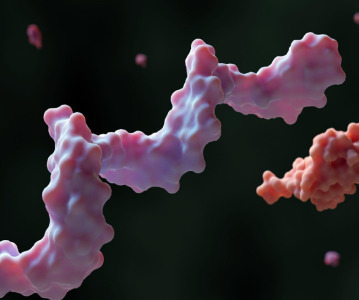Study demonstrates potential of blood test for early lung cancer detection

Ground-breaking trial demonstrates potential of blood test which harnesses the power of the immune system to reduce late detection of lung cancer.
Data, presented by Professor Frank Sullivan (Chief Investigator on the ECLS trial) demonstrates the potential of Oncimmune’s EarlyCDT Lung test to reduce the incidence of patients with late-stage lung cancer at diagnosis, compared with standard clinical diagnosis.
In a randomised controlled trial of 12,209 people in Scotland at high risk of developing lung cancer, it was shown that more people were diagnosed at an early stage of the disease in the two years after taking the EarlyCDT Lung test than those in the control arm who received standard clinical care.
The findings, presented at the 2019 World Conference on Lung Cancer hosted by the International Association for the Study of Lung Cancer (IASLC) in Barcelona today, are an important validation of Oncimmune’s diagnostic platform technology which harnesses the power of the immune system, to detect evidence of the body’s natural response to cancer. The technology can detect cancer four years or more before standard clinical diagnosis.
Oncimmune’s patented technology works by detecting the presence of autoantibodies generated by the body’s immune system as a natural defence against cancer cells. Lung cancer was chosen as the first target of the technology because it is the world’s leading cause of cancer-related death and is often detected at an advanced stage with approximately 85% of patients in the UK undiagnosed until the disease has spread to other parts of the body.
The ECLS trial is believed to be the largest randomised controlled trial for the detection of lung cancer using biomarkers conducted anywhere in the world.
Among those people who received the EarlyCDT Lung test and went on to develop lung cancer within the next two years, 41.1% were diagnosed at an early stage (stage 1&2) of the disease, compared with 26.8% among the control group subject to standard clinical practice. This resulted in a 36% reduction in late-stage presentation after 2 years of follow up in subjects randomised to the EarlyCDT test.
The trial also showed a lower rate of deaths among people in the intervention arm of the trial after two years compared with people in the control group. Lung cancer-specific deaths were also lower in the intervention group. This suggests that the EarlyCDT Lung test followed by CT imaging could produce a mortality benefit, although the trial was not powered to demonstrate such a trend after 2 years.
The next step is to move to a larger population-based evaluation in up to 200,000 patients to assess the implications of diagnosis with EarlyCDT Lung on survival and mortality in a real-world setting.
Adam Hill, CEO of Oncimmune, commented: “We are thrilled that the ECLS trial has demonstrated so clearly the potential of our EarlyCDT technology platform to transform the way cancer is diagnosed. We look forward to working with health authorities in Scotland and beyond to roll out EarlyCDT Lung more widely, with the aim of saving lives and reducing costs for the NHS and other healthcare systems around the world. Meanwhile, we are continuing to test our technology on other forms of cancer, including liver, ovarian, breast and prostate, in pursuit of our ambition to build the leading immunodiagnostic platform in the field of oncology.”
Professor Frank Sullivan, Professor of Primary Care Medicine at the University of St Andrews, the Chief Investigator for the ECLS trial, commented: “These landmark findings are likely to have globally significant implications for the early detection of lung cancer by showing how a simple blood test, followed by CT scans, is able to increase the number of patients diagnosed at an earlier stage of the disease, when surgery is still possible and prospects for survival much higher.”
Related News
-
News Google-backed start-up raises US$600 million to support AI drug discovery and design
London-based Isomorphic Labs, an AI-driven drug design and development start-up backed by Google’s AI research lab DeepMind, has raised US$600 million in its first external funding round by Thrive Capital. The funding will provide further power t... -
News AstraZeneca to invest US$2.5 billion in Beijing R&D centre
Amid investigations of former AstraZeneca China head Leon Wang in 2024, AstraZeneca have outlined plans to establish its sixth global strategic R&D centre in China. Their aim is to further advance life sciences in China with major research and manufact... -
News Experimental drug for managing aortic valve stenosis shows promise
The new small molecule drug ataciguat is garnering attention for its potential to manage aortic valve stenosis, which may prevent the need for surgery and significantly improve patient experience. -
News How GLP-1 agonists are reshaping drug delivery innovations
GLP-1 agonist drug products like Ozempic, Wegovy, and Mounjaro have taken the healthcare industry by storm in recent years. Originally conceived as treatment for Type 2 diabetes, the weight-loss effects of these products have taken on unprecedented int... -
News A Day in the Life of a Start-Up Founder and CEO
At CPHI we work to support Start-Up companies in the pharmaceutical industry and recognise the expertise and innovative angles they bring to the field. Through our Start-Up Programme we have gotten to know some of these leaders, and in this Day in the ... -
News Biopharmaceutical manufacturing boost part of new UK government budget
In their national budget announced by the UK Labour Party, biopharmaceutical production and manufacturing are set to receive a significant boost in capital grants through the Life Sciences Innovative Manufacturing Fund (LSIMF). -
News CPHI Podcast Series: The power of proteins in antibody drug development
In the latest episode of the CPHI Podcast Series, Lucy Chard is joined by Thomas Cornell from Abzena to discuss protein engineering for drug design and development. -
News Amgen sues Samsung biologics unit over biosimilar for bone disease
Samsung Bioepis, the biologics unit of Samsung, has been issued a lawsuit brought forth by Amgen over proposed biosimilars of Amgen’s bone drugs Prolia and Xgeva.
Position your company at the heart of the global Pharma industry with a CPHI Online membership
-
Your products and solutions visible to thousands of visitors within the largest Pharma marketplace
-
Generate high-quality, engaged leads for your business, all year round
-
Promote your business as the industry’s thought-leader by hosting your reports, brochures and videos within your profile
-
Your company’s profile boosted at all participating CPHI events
-
An easy-to-use platform with a detailed dashboard showing your leads and performance







.png)